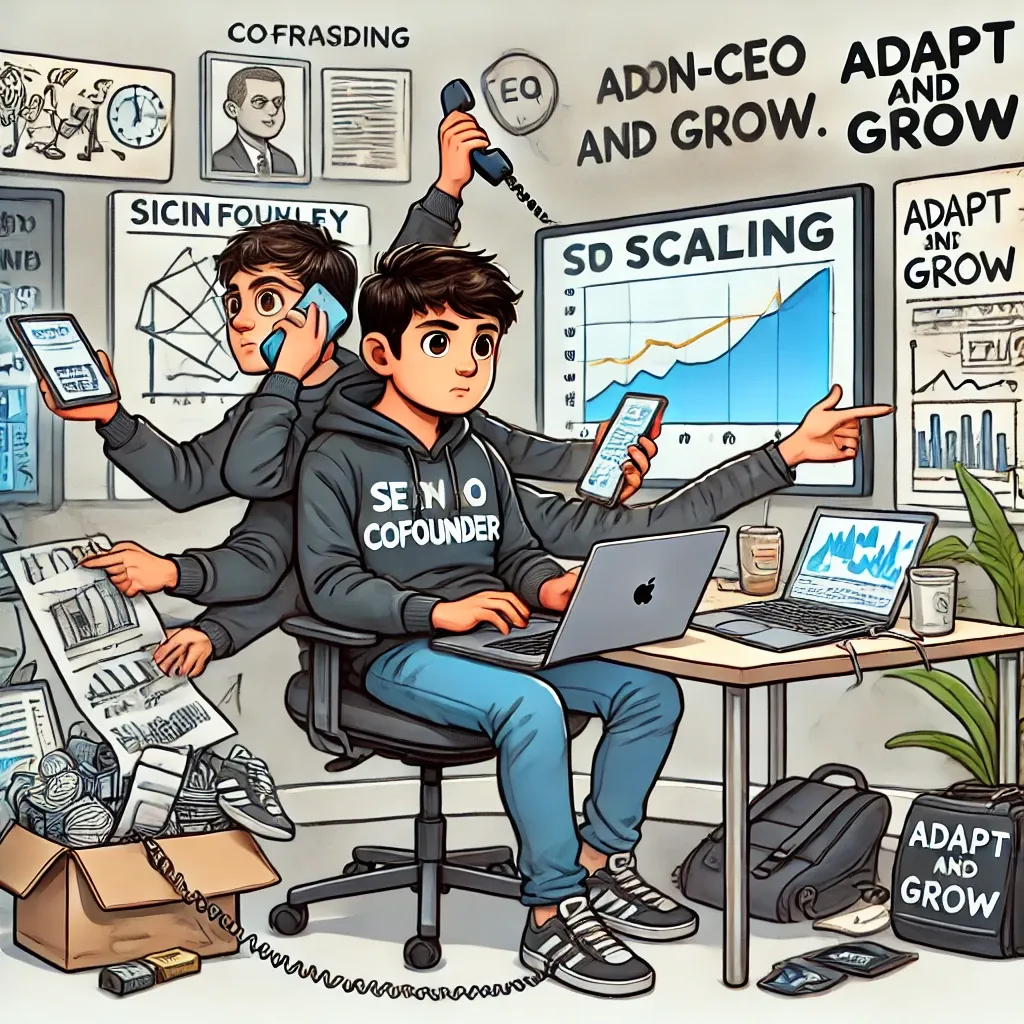How to avoid becoming the cofounder who doesn't scale
The cofounder who doesn't scale is almost always the non CEO. Avoiding that fate is about managing both perception and performance.

There's lots of advice out there on what to do about a cofounder who doesn't scale. Usually, that cofounder is you, the non CEO. Here's how to avoid being that person.
What it means to scale as a cofounder
Unlike bigger companies that are scaling, where change is merely rapid, a scaling early-stage startup feels like a caterpillar bursting out of a chrysalis every other week. There are new tasks, like ramping up marketing after getting to market or establishing a customer success function. There's more detail in the existing tasks, like ever more detailed product analysis. And there's the coordination of all these tasks as the number of people, both employees and service providers, ramps up.
Scaling is critical, both for you and for your startup. Cofounder conflict and cofounder breakups are one of the leading causes of startup failing. (Noam Wasserman's The Founder's Dilemmas is eye opening on this.) The better both you and your cofounder CEO scale, the less risk to your startup.
Why CEOs usually scale well, at least for a while
Scaling has two components: perception, and capabilities.
Scaling is a perception in the sense that many of those judging whether a cofounder scales are not in the day-to-day. They're making decisions on what they see, which is a limited sample. This includes investors, board members, and advisors.
Your CEO cofounder has positional power, just by virtue of their role. So when a CEO presents in a board meeting, by definition, they sound like a CEO. And, when they present your startup's results, the board members have no idea what the CEO actually drove vs what the rest of the team made happen. But the CEO still gets credit. These are powerful mediators of the perception of scaling.
Capabilities matter too, and here your cofounder CEO has role-based benefits as well. The CEO isn't expected to be an expert in everything. If there's a specific business skill they show a lack of prowess at, the advice of investors and board members will be to hire someone or outsource it. If the gap is something key to the CEO role, the board will usually step in to coach heavily, because losing a CEO early can often cause a startup to fail.
So, the built-in benefits of position help the CEO scale initially, especially early on when a startup is fragile and there's likely no money to hire an outside CEO.
Why non CEOs don't scale as often
Non CEO cofounders often don't scale as fast for the same reasons - perception and capabilities.
The positional power of CEOs definitely does not extend to the other cofounder. When you speak up in a board meeting (if you are even there), you are fighting not to sound like a newbie cofounder by virtue of your position.
And while CEOs don't have to be good at every or really any specific part of the operation that's not fundraising or managing the board and investors, you need to nail your areas. Early on you probably have more than one, like engineering, product, design, and sales. You almost certainly don't have expertise across each of them. But if your revenue hasn't scaled enough to hire a head of sales, you will be expected to deliver across all of these. It's a great opportunity to learn something new and rise to the challenge, but you also run the risk of being judged as not scaling fast enough no matter how fast you move.
What you can do to avoid being the cofounder who doesn't scale
You can help yourself scale by addressing both the perception of you and your capabilities.
To manage investor and board perception you might:
- Get yourself on the board from the start (even if you don't keep a board seat over time), or ask early on to be invited to board meetings. Not having a seat at the table makes you seem weak.
- Build individual relationships with investors and board members as appropriate. This can be a little awkward, and you'll want to coordinate with your cofounder CEO rather than sort of sneaking around, but liking aids perception. It also means you are more likely to get feedback and advice that will help you grow in your role, and consequently help your startup.
- Don't step on your cofounder CEO's toes. Your role is not to be CEO, and if you sound like a mini CEO, you'll weaken your cofounder and yourself. Pick the perception you want - rockstar CTO up to date on all things AI, head of revenue gifted at making money, whatever - and play up your expertise there. Carve out a separate role that the board and investors can respect.
To manage your capabilities:
- Feedback can be scarce and confusing in a startup environment. Get feedback from your CEO, advisors, anyone who can help. Learn as fast as you can.
- Make sure you are spending time on things that matter and not getting drawn into irrelevant details. Done is better than perfect for most things, and the more you deliver, the more you learn what is working and what isn't. Those lessons help you and help the business scale.
- Consider working with a coach. Sounds trite, but having someone to talk frankly with and who can help you reflect on your growth is incredibly helpful. Email me at othercofounder at gmail for mine, who has been critical in helping me scale and is reasonably priced.
- Think carefully about what functions you are likely to be good at scaling, and hand off the others. This essay on giving away your legos, by Molly Graham, is a great framework for thinking about how responsibilities change as startups grow.
What to do if you find yourself not scaling
Congratulations on being honest with yourself. The answers here are kind of obvious - get advice, get coaching, restructure your role, leave with grace and class.
Instead of that kind of advice, which you already know, this is what I want to say to you:
- It is ok to leave your startup at any point if it's not working for you or the company. The sun will rise tomorrow and you'll feel like you can breathe again.
- Context always matters. A lot. The fact that the context of your current startup didn't work for you doesn't mean that you're not cut out for the startup world, or to be a cofounder, or even to be a CEO cofounder.
There's life after your startup. You're going to be ok.
I'm not your lawyer, your therapist, your advisor, or your accountant. We're just internet friends, and these are just my experiences and personal opinions. Consult professionals for advice before you make any sudden moves in your startup.
You will see the occasional affiliate link. I do earn a commission if you buy the products I recommend. I appreciate you buying through the links if you're going to buy. This is a labor of love for my fellow cofounders, and I do love receiving a few coins to pay hosting costs if you like my work.




